I
always thought the Battle of the Bulge was the last major offensive by the
Germans on the western front in World War II. In writing the biography of my
friend, Ed, a World War II infantryman during Operation North Wind, I learned
something new.
For Operation
North Wind (Unternehmen Nordwind), Hitler gave orders to
destroy the American forces in the Vosges Mountains.
As the German advance in the
Battle of the Bulge stalled, Hitler went back to one of the rejected earlier
plans. The fighting in the north had pulled Patton’s army to the Ardennes, so
the new attempt at attacking the allies occurred in the Alsace region on
December 31, 1944, one hour before midnight.
With the movement of Patton’s
troops to fight in the Battle of the Bulge to the north, the lines of the
Seventh Army were spread thin.
For the second time within the
month of December, allied command was surprised by a ferocious German attack,
this time on New Year’s Eve. Earlier, the British had been able to intercept and
break the code of radio communications from the Germans. This worked very well
when the Germans were in French territory. But after the German forces withdrew
into Germany, they relied on wire communications rather than wireless that
could be intercepted. The allies had
lost surveillance of a number of German units but did pick up hints of a buildup
opposite the American Seventh Army. Other evidence included increased refugee
movement toward the west and a break in German radio silence on New Year’s Eve.
Dissent also existed within
allied command. With some of the initial signs of a buildup of enemy troops, Eisenhower
had given orders to General Devers of the Sixth Army Group to retreat if
attacked. He wanted to avoid another situation as in the Battle of the Bulge
where the Germans had surrounded allied troops in Bastogne. The Sixth Army
Group consisted of the US Seventh Army under General Patch and the French First
Army under General Lattre de Tassigny. Patch had the unenviable position of
defending a front of over 125 miles with six infantry divisions. Within the
Seventh Army, General Haislip’s XV Corps made up of the 44th, 100th
and 103rd Divisions had thirty-five miles along the Vosges to defend.
De Gaulle became aware of
Eisenhower’s direction to Devers to be prepared to fall back and strenuously
objected, since he did not want to give up Strasbourg, which had been
recaptured by the Allies. Strasbourg lay on the French side of the border, but
had been a contested city for years between France and Germany. De Gaulle knew
that if the Germans retook the city, numerous French citizens would be
slaughtered for defying the Nazis. Strasbourg remained second only to Paris as
a symbol of the rebirth of France after German domination. De Gaulle threatened
to pull the French troops out of the alliance if Strasbourg were not defended. This
led to a meeting between Churchill, Eisenhower and De Gaulle. Churchill sided
with De Gaulle that Strasbourg should not be given up. A repercussion was that
de Gaulle lost his trust in American command, which played out years later in
his independent attitude, refusal to join NATO and hostility toward the United
States.
The initial advances made by
the Germans early in January, 1945, in Operation North Wind were stopped, and
from then on, the Allies made the advances.




















